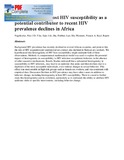Heterogeneity in host HIV susceptibility as a potential contributor to recent HIV prevalence declines in Africa

View/
Date
2009Author
Nagelkerke, Nico J D
Vlas, Sake J de
Jha, Prabhat
Luo, Ma
Plummer, Francis A
Kaul, Rupert
Type
ArticleLanguage
enMetadata
Show full item recordAbstract
Background
HIV prevalence has recently declined in several African countries, and prior to this the risk of HIV acquisition per unprotected sex contact also declined in Kenyan sex workers. We hypothesized that heterogeneity in HIV host susceptibility might underpin both of these observations.
Methods
A compartmental mathematical model was used to explore the potential impact of heterogeneity in susceptibility to HIV infection on epidemic behavior, in the absence of other causative mechanisms.
Results
Studies indicated that a substantial heterogeneity in susceptibility to HIV infection,, may lead to an epidemic that peaks and then declines due to a depletion of the most susceptible individuals, even without changes in sexual behavior. This effect was most notable in high-risk groups such as female sex workers, and was consistent with empirical data.
Discussion
Declines in HIV prevalence may have other causes in addition to behavior change, including heterogeneity in host HIV susceptibility. There is a need to further study this heterogeneity and its correlates, particularly as it confounds the ability to attribute HIV epidemic shifts to specific interventions, including behavior change.
URI
http://www.ncbi.nlm.nih.gov/pmc/articles/PMC2764323/http://erepository.uonbi.ac.ke:8080/xmlui/handle/123456789/19699
Citation
AIDS. 2009 January 2; 23(1): 125–130.Publisher
Department of Medical Microbiology
Description
Full text
Collections
- Faculty of Health Sciences (FHS) [10377]
